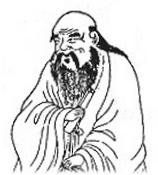Home
Authors
Titles
Keyword Search
Reference
|
Scholars are divided on the question of whether a single individual known as Lao Tse ever lived. The name "Lao Tse" means literally "Old Boy" or "Old Master" (that is, teacher) and could be simply a way of personifying the source of the body of collected sayings that came to be known as the Tao Te Ching. Various legends have Lao Tse being conceived by a falling star, spending either 66 or 81 years in his mother's womb, and being born with a full head of white hair. This seems to be a fanciful attempt to account for the name "Old Boy." Other legends have him living as long as two hundred years, after which he rides off either into the desert or into India, stopping at the border to write the Tao Te Ching to leave his wisdom behind. Other traditions hold that Lao Tse lived in the 6th century B.C., possibly from around 570 to 490 B.C. He served as keeper of the imperial archives or court librarian at Loyang, in Honan province, and was a contemporary of Confucius, though about 20 years older. In support of this view is the fact that conversations between Lao Tse and Confucius are recorded in the writings of Chuangtse, a disciple of Lao Tse, and in the Liki, a Confucian text. Critics counter that the reference in the Liki is somewhat obscure, and that Chuangtse lived two centuries after Lao Tse supposedly lived and may have been the one to "invent" Lao Tse as the source of the compiled sayings.
The Classical Library,
© 2001.. |
Home
Authors
Titles
Keyword Search
Reference
 Lao Tse (possibly 6th Century B.C.)
Lao Tse (possibly 6th Century B.C.)